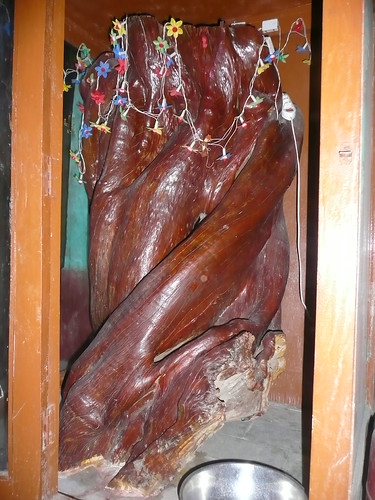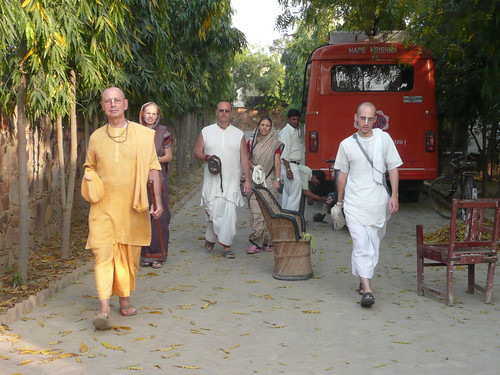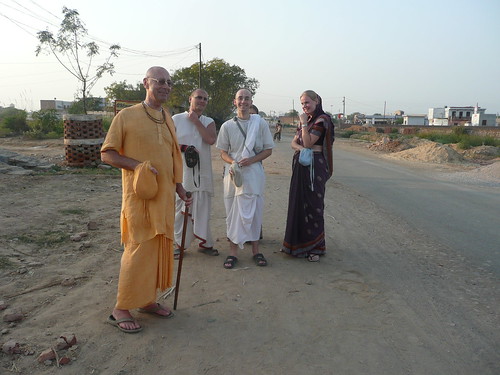Cargado el 2 de mayo, 2010
por kepfenyek
2010-03-17 Parikrama to Paitha with pictures of Petha Village and Aitha-kadamba
P1050918

P1050921

P1050922

P1050929

Cargado el 2 de mayo, 2010
por kepfenyek
2010-03-15 Pictures of parikrama to beautiful Candra-sarovara
P1050803

P1050805

P1050806

P1050809

P1050810

Baddha-daçä - the state of bondage; the state of the jévas in material existence.
Baddhävasthä - same as baddha-daçä.
Bahiraìgä-çakti - the external or material potency of Bhagavän, also known as mäyä-çakti. This potency is responsible for the creation of the material world and all affairs pertaining to the material world. Because Bhagavän never directly contacts the material energy, this potency is known as bahiraìgä, external.
Bahirmukha - having one’s face turned away; having one’s attention diverted away from some object. This is commonly used with the word Kåñëa (see Kåñëa-bahirmukha).
Bahüdaka - the second of four stages of sannyäsa. When a sannyäsé advances beyond the kuöicaka stage, he no longer accepts anything from home; instead he collects his necessities from many places. This system is called madhukäré, which literally means ‘the profession of bumblebees’. As bumblebees collect honey from many flowers, so a sannyäsé should beg from door to door but not accept very much from any particular house. The bahüdaka stage has been mentioned in Çrémad-Bhägavatam (3.12.43). In his commentary on this çloka, Çréla Viçvanätha Cakravarté Öhäkura defines the ascetic in this stage as, one who has relegated the performance of karma to a secondary position and who gives prominence to transcendental knowledge.
Bandä - an Islamic term for servitor.
Behesht - an Islamic term for the Lord’s spiritual abode, paradise, or heaven.
Bhägavata-pravåtti - the tendency of the jéva to seek out and serve the Supreme Person, Bhagavän.Bhagavat-tattva - the fundamental conclusions which regard the Absolute Truth, Bhagavän.
Bhakta - a devotee.Bhakty-äbhäsa - externally resembles bhakti but does not have the true characteristics of bhakti. There are two types of bhakty-äbhäsa.
Chäyä-bhakty-äbhäsa is attained by association with çuddha-bhaktas during kértana, recitation of Çrémad-Bhägavatam, or other devotional performances. Pratibimba-bhakty-äbhäsa is the semblance of bhakti that occurs in the hearts of those who adopt the aìgas of bhakti with a desire for bhukti (material enjoyment) and mukti (liberation).
The stage of chäyä-bhakty-äbhäsa is the result of great fortune,
Bhärata-varña - India (see Glossary of Places).
Bhäva-bhakti - the initial stage of perfection in devotion. A stage of bhakti in which çuddha-sattva, or the essence of Çré Kåñëa’s internal potency consisting of spiritual knowledge and bliss, is transmitted into the heart of the practicing bhakta from the heart of one of His eternal associates and softens the heart by different kinds of tastes. It is the first sprout of prema, or pure love of God. Bhävabhakti is the seventh of the eight stages of development of the bhakti-latä, the creeper of devotion.
In Çré Båhad-Bhagavatämåta there are five divisions of bhäva accepted amongst bhaktas: 1) jïäna-bhakta (e.g. Bharata Mahäräja), 2) çuddha-bhakta (e.g. Ambariña Mahäaräja), 3) prema-bhakta (e.g. Hanumän), 4) prema-para-bhakta (e.g. the Päëòavas headed by Arjuna), and 5) premätura-bhakta (ätura means ‘very eager for’, or agitated out of prema e.g. the Yädavas headed by Uddhava).
Bhävuka - (1) a bhakta at the stage of bhäva who is thus able to taste spiritual sentiments. (2) This word is sometimes used in a slightly derogatory sense to refer to those who are prone to emotional displays without possessing the true characteristics of kåñëarati, or bhäva.
Bhedäbheda-prakäça - a manifestation simultaneously distinct yet not separate from Çré Bhagavän.
Bhoga - material enjoyment. Unoffered foodstuffs.
Bhogé - one who indulges in material enjoyment without restriction; one who seeks material enjoyment as his life’s aspiration.
Bhukti - material enjoyment.
Bhüta - one of the five elements; any living being; a spirit, ghost or demon.
Béja - a seed (see bhakti-latä-béja).
Brahmacäré - the first äçrama or stage of life in the varëäçrama system; unmarried student life.
Brahma-gäyatré - a Vedic mantra which is chanted at the three junctures of the day by brähmaëas.
Brahma-jïäna - knowledge of impersonal brahma; knowledge aiming at impersonal liberation.
Brahma-jïäné - see jïäné.
Brahma - the spiritual effulgence emanating from the transcendental body of the Lord; the all-pervading, indistinct feature of the Absolute. Depending on the context, this may sometimes refer to the Supreme brahma, Çré Kåñëa, who is the source of brahma.
Brähmaëa - the highest of the four varëas or castes in the varëäçrama system; a priest or teacher.
Brähmaëé - a female brähmaëa; the wife of a brähmaëa.
Brahma-pravåtti - the tendency of the jéva to seek the all-pervading brahma.
Brahma-väda - the doctrine of indistinct nirviçeña-brahma which has as its goal the merging of the self into Kåñëa’s effulgence.
Brahma-vädé - one who follows the doctrine of brahma-väda.
Båhat-caitanya - infinite spiritual consciousness, represented by Kåñëa.
Båhat-cit-vastu - vast or infinite spiritual substance; Çré Kåñëa.
Buddhi-apekñä - the consideration that takes place through one’s intelligence of the sublime nature of madhura rasa and which in turn assists in creating lobha.
But-parast - (Muslim) idolatry; worship of material elements, spirits, or ordinary living beings.
| Conceptos Hinduistas (1428)SC |
|---|
Category:Hindu (mythology) (3256)SC | Category:Hindu mythology (3270)SC | Categoría:Mitología hindú (3288)SC (indice) | Categoría:Mitología hindú (videos) (3289)SC | Conceptos Hinduista (A - G) SK y SC (videos) (3294)SC Aa-Anc · Aga - Ahy · Ai - Akshay · Akshe - Amshum · Ana - Ancie · Ang - Asvayu · Ata - Az · Baa-Baz · Be-Bhak · Bhal-Bu · C · Daa-Daz · De · Dha-Dry · Du-Dy · E · F · Gaa-Gayu · Ge-Gy · Ha-He · Hi-Hy · I · J · K · Ka - Kam · Kan - Khatu · Ki - Ko · Kr - Ku · L · M · N · O · P · R · S · Saa-San · Sap-Shy · Si-Sy · Ta - Te · U · V · Ve-Vy · Y · Z |
| Conceptos Hinduistas (2919)SK | (2592)SK |
|---|
Aa-Ag · Ah-Am · Ana-Anc · And-Anu · Ap-Ar · As-Ax · Ay-Az · Baa-Baq · Bar-Baz · Be-Bhak · Bhal-Bhy · Bo-Bu · Bra · Brh-Bry · Bu-Bz · Caa-Caq · Car-Cay · Ce-Cha · Che-Chi · Cho-Chu · Ci-Cn · Co-Cy · Daa-Dan · Dar-Day · De · Dha-Dny · Do-Dy · Ea-Eo · Ep-Ez · Faa-Fy · Gaa-Gaq · Gar-Gaz · Ge-Gn · Go · Gra-Gy · Haa-Haq · Har-Haz · He-Hindk · Hindu-Histo · Ho-Hy · Ia-Iq · Ir-Is · It-Iy · Jaa-Jaq · Jar-Jay · Je-Jn · Jo-Jy · Kaa-Kaq · Kar-Kaz · Ke-Kh · Ko · Kr · Ku - Kz · Laa-Laq · Lar-Lay · Le-Ln · Lo-Ly · Maa-Mag · Mah · Mai-Maj · Mak-Maq · Mar-Maz · Mb-Mn · Mo-Mz · Naa-Naq · Nar-Naz · Nb-Nn · No-Nz · Oa-Oz · Paa-Paq · Par-Paz · Pe-Ph · Po-Py · Raa-Raq · Rar-Raz · Re-Rn · Ro-Ry · Saa-Sam · San-Sar · Sas-Sg · Sha-Shy · Sia-Sil · Sim-Sn · So - Sq · Sr - St · Su-Sz · Taa-Taq · Tar-Tay · Te-Tn · To-Ty · Ua-Uq · Ur-Us · Vaa-Vaq · Var-Vaz · Ve · Vi-Vn · Vo-Vy · Waa-Wi · Wo-Wy · Yaa-Yav · Ye-Yiy · Yo-Yu · Zaa-Zy |


No hay comentarios:
Publicar un comentario